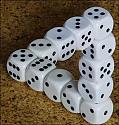Here is a little more of the unindexable
logic kind:
From http://www.amazon.com/Unconscious-Infinite-Sets-Bi-logic-Maresfield/dp/1855752026/ref=sr_1_1?ie=UTF8&qid=1286932010&sr=8-1
Unconscious
logic underlies the language of poetry, dreams, jokes, propaganda, racism,
advertisement, religion, and figures of speech. This Alice in Wonderland logic is generated by the
Unconscious mind by the mechanisms of condensation, displacement,
symbolization, concretization and hallucinations. This logic was conceptualized
by Freud as the primary process and by Matte Blanco as symmetrical logic.
The
other half, the Conscious, is where instinctual energy is transduced into
factually based logic that attempts to keep us from being eaten alive by our
fellow carnivores. This Aristotelian logic is generated by our conscious mind;
Freud conceptualized this as the secondary process and Matte Blanco as
asymmetrical logic.
The
Unconscious mind has a logic that is depended on similarities being equal, or
what Von Domarus called "predicate identification." The
mathematician, Dedekind, stated that a set is infinite if subsets of itself can
be put to a one to one correspondence with itself. In other words, a part is
equal to the whole. This is Von Domarus' predicate identification. This is the
basis of Unconscious logic. It is not irrational it is non-rational.
Eerie, huh?
-Rich
Sincerely,
Rich Cooper
EnglishLogicKernel.com
Rich AT EnglishLogicKernel DOT com
9 4 9 \ 5 2 5 - 5 7 1 2
From: ontolog-forum-bounces@xxxxxxxxxxxxxxxx
[mailto:ontolog-forum-bounces@xxxxxxxxxxxxxxxx] On Behalf Of Rich Cooper
Sent: Tuesday, October 12, 2010
4:48 PM
To: '[ontolog-forum] '
Subject: Re: [ontolog-forum] HOL
decidability [Was: using SKOS forcontrolled values for controlledvocabulary]
Dear John, Chris, Doug and Ed,
Comments below,
-Rich
Sincerely,
Rich Cooper
EnglishLogicKernel.com
Rich AT EnglishLogicKernel DOT com
9 4 9 \ 5 2 5 - 5 7 1 2
-----Original Message-----
From: ontolog-forum-bounces@xxxxxxxxxxxxxxxx
[mailto:ontolog-forum-bounces@xxxxxxxxxxxxxxxx] On Behalf Of John F. Sowa
Sent: Tuesday, October 12, 2010 5:51 AM
To: ontolog-forum@xxxxxxxxxxxxxxxx
Subject: Re: [ontolog-forum] HOL decidability [Was: using SKOS for controlled
values for controlledvocabulary]
Chris, Rich, and Doug,
I agree with Chris M. about the issues in this
thread. But I'd like
to add a few more points.
Not so fast! I'm sure you remember
that the set of primes is infinite, and that there is no (known) function that can
iterate them. Godel showed that there are theorems which though true
cannot be proven, and theorems which though false cannot be disproved, all
based on the primes. Chris and John, there are programs in Higher Order
Logic (HOL) which cannot be proven or disproven, i.e., they cannot be
constructed from AND, OR, NOT or any function you can think of. Therefore
HOL is more expressive (can express more truths) than FOL, period.
Remember Hoftadter's Godel, Escher Bach which high school
technophiles have read ever since its publication. Here are some of those
impossible constructions, expressed in a higher order logic than any strongly
typed FOL CAD system can, even when its FOL primitives have been combined in
well formed ways to generate something visually similar:



I’m sure you remember other Escher
visualizations which don’t limit the observer to simplistic algebraic
representations. Higher order logic allows people to interpret
experiences based on their similarity to previously experienced events.
Even events that cannot be cleanly decomposed into factors of logic can
be expressed in HOLs. That is why they are HIGHER order logics.
Yes, programs can be written that do not
terminate, and yet which are valuable in themselves. And yes, HOL really
can express situations that FOL cannot.
-Rich
The term HOL (higher-order logic) has been bandied about in many
different ways. Logicians reserve it for a particular kind of
semantics that includes an infinite hierarchy of infinite sets.
There are several versions, but following is the basic idea:
1. There is a starting set whose elements are called
individuals.
To be concrete, a typical example would be the
set N of
non-negative integers. For that N, there
are countably many
individuals, but one could have larger or
smaller sets.
2. The basic quantifiers range over N. A typical FOL
statement
about integers would not use quantifiers over
anything else.
3. Second-order logic would add another, much larger domain of
quantification. Depending on which
variant of SOL one is
talking about, that domain could include the
set of all subsets
of N, the set of all relations over N, the set
of all functions
over N, or the set that includes all of them.
In any case, if
N is countable (Aleph 0), this set is
uncountable (Aleph 1).
4. The next level in the hierarchy has a domain of
quantification
that would include sets of all subsets of the
previous domain
(or all functions or all relations over that
domain). If the
previous domain was of size (Aleph n), this
one is of size
(Aleph n+1).
Some logicians would say that this hierarchy goes beyond logic
to a very rich version of set theory. (I agree with them.)
In any case, that huge hierarchy of increasingly larger infinities
creates huge problems about computational complexity, etc.
But most (perhaps all) of the computational systems that use the
term HOL *don't* assume this infinite hierarchy. They just have
a single domain of quantification. If you have a sorted logic,
that domain could be partitioned into separate subdomains for
individuals, sets, functions, and relations.
But whether or not you choose to partition the domain, this
approach is far more manageable. And as a matter of fact, it
does not go beyond FOL methods of proof theory. In fact, this
approach is the one that was adopted for Common Logic.
CL lets you have quantifiers that range over functions and
relations, but the proof procedures are purely first-order
in style and complexity.
RC:
>> Higher-order languages are indeed more expressive [than FOL].
>> As a consequence, they are not even partially decidable.
DF:
> Maybe Higher-order languages as a whole are not even partially
decidable,
> but large numbers of statements in them are. It was noted
that normal
> computer languages embodied HOL. Note that well-written
programs in
> such languages are decidable. Of course, it is possible to
write
> programs which aren't.
I would avoid using the term HOL because it is ambiguous.
Logicians
think HOL implies that infinite hierarchy. But programmers who
have
implemented useful tools that allow quantifiers over functions and
relations have implemented something that is closer to the CL approach
than to the logicians' conception of HOL.
In short, you can let your quantifiers range over functions and
relations without going beyond FOL. In fact, you can even have
decidable subsets of FOL that let quantifiers range over relations.
John
_________________________________________________________________
Message Archives: http://ontolog.cim3.net/forum/ontolog-forum/
Config Subscr:
http://ontolog.cim3.net/mailman/listinfo/ontolog-forum/
Unsubscribe: mailto:ontolog-forum-leave@xxxxxxxxxxxxxxxx
Shared Files: http://ontolog.cim3.net/file/
Community Wiki: http://ontolog.cim3.net/wiki/
To join: http://ontolog.cim3.net/cgi-bin/wiki.pl?WikiHomePage#nid1J
To Post: mailto:ontolog-forum@xxxxxxxxxxxxxxxx


